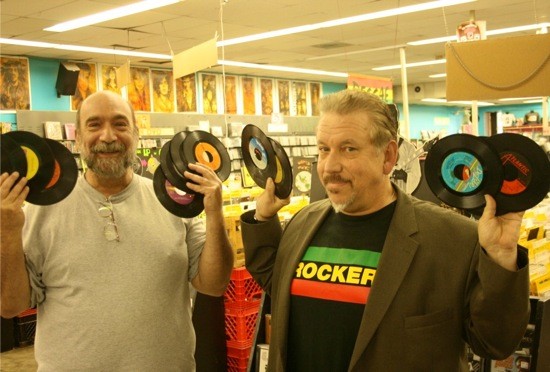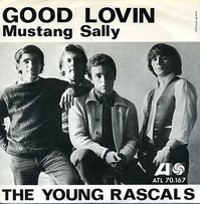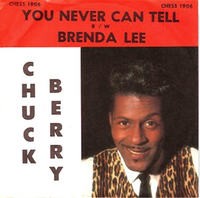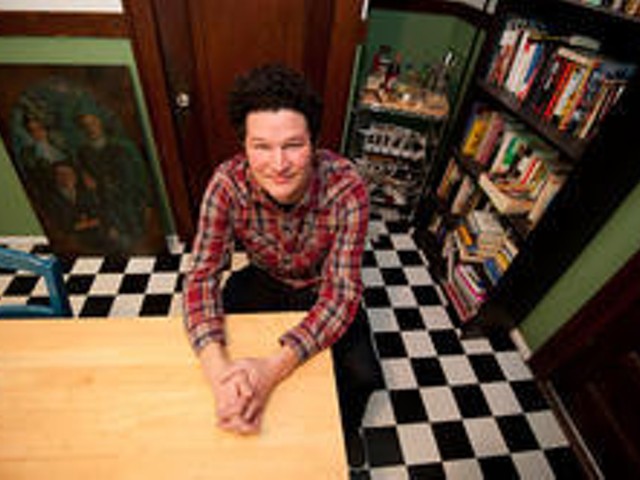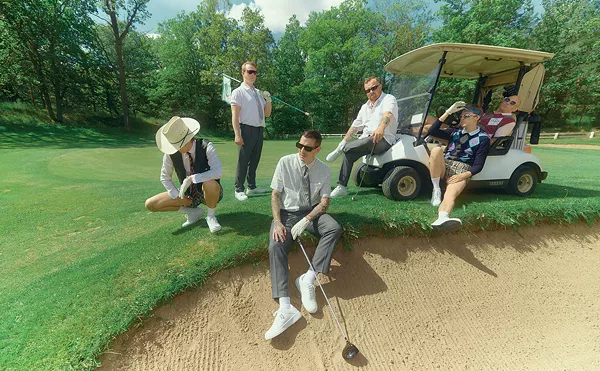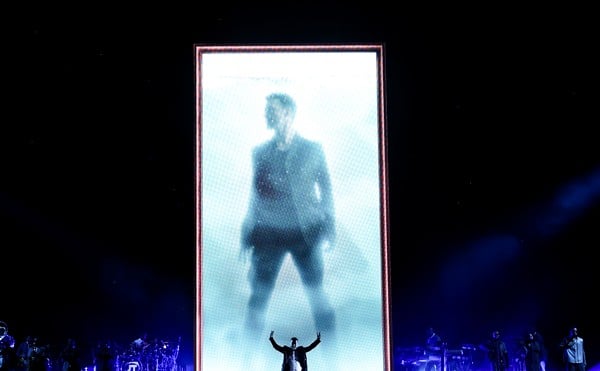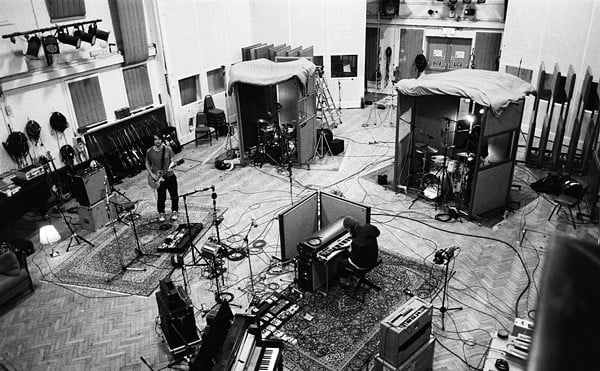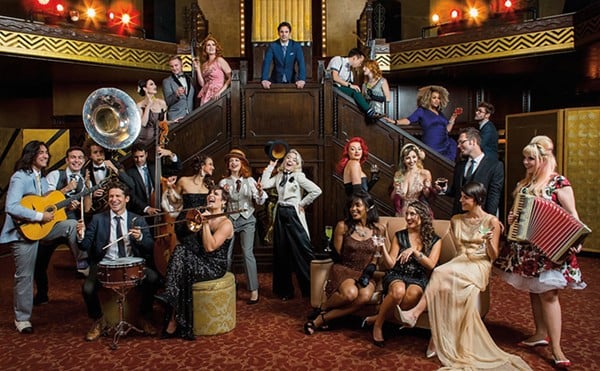Having interviewed over 50 of St. Louis' record aficionados, Last Collector Standing is ending the column on an interview with the proverbial "kings of the scene," Vintage Vinyl owners Tom "Papa" Ray and Lew Prince. For over 30 years, Vintage Vinyl (6610 Delmar Boulevard, 314-721-4096) has been hub for local music lovers, introducing thousands of people to new and exciting musical acts and exposing each new generation to the experience of vinyl. The store is now a must-see St. Louis landmark, still drawing people away from their computers and into the record store. We met with Ray and Lew in the office of Vintage Vinyl, where we discussed how the duo got their start in the record business and the future of music in the digital age.
Last Collector Standing: What's been your favorite experience as owners of a record store?
Tom "Papa" Ray: Not being forced to work for someone else in the music business.
Lew Prince: I always come back to the same one, which was when we had the very first store. It was 6354 Delmar. The jazz department here is 460 square feet. That store was 400. I'm playing an Elmore James record and this dapper, little black man -- I mean like this skinny brim hat, plaid jacket, and creases you could slice bread with -- he walks in.
"That Elmo James?"
"Yep"
"I used to play with Elmo."
"Go on."
"Yeah, I used to play the saxophone."
I happened to have had my horn, actually it was Tom's alto, sitting under the counter. So I pull it out from under the counter.
"Oh, doctor says I'm not suppose to do that anymore."
So he walks to the back of the store, puts his head under the speaker, and finally walks back and picks up the horn and just starts blowing with the record. It was spectacular. I mean he blew his ass off. He played for fifteen minutes maybe. I turned the record over. He played through the other side. When the side was over he walked up to the counter and put the horn down on the counter and said, "Man, I needed that!"
And then he walked out. I never got the guy's name or anything. [Laughs] That is my single favorite moment [owning] the store.
Ray: Having an ongoing musical ministry for 30 years in St. Louis has many of its own rewards.
How did you both initially meet and open up Vintage Vinyl?
Prince: We went to college together. Tom and I have real similar musical interest. His was the only dorm room besides mine that you could walk by and hear Howlin' Wolf one day and Archie Shepp the next. We both have really broad palates. We always got along musically.
We had had plenty of record store experiences. I worked for a distributor. Tom worked for a distributor. And we both thought pretty much that record stores were stupid and badly run. When we realized we were hitting 30 and probably needed a real job for a while we put this together.
We had no money. I was a teacher's aid in the city. Tom had just left working at a distributor in New York and moved out here because we went to school here. We started out with 300 records and a twenty dollar booth at Soulard market. The booth was twenty bucks because back then they would only rent to farmers, but the farmer paid ten and we paid another ten on top of it. We did that for all of the summer and fall of 1979. When it got cold we rented a store.
Was it known as Vintage Vinyl at that point?
Prince: We were just the two weird record guys at Soulard until we rented the storefront and came up with the name. There's the first sign [points to wall]. It's up behind those boxes.
You named the store Vintage Vinyl. Was vinyl already considered vintage in 1980?
Prince: Here's the deal. There was nothing else. There were cassettes and 8-tracks, which nobody who was interested in music took seriously. We wanted to do used records and when you only have 400 square feet that's probably a good choice. We only got into new records when our customers demanded it. We put it right near Streetside so we wouldn't have to have new records.
Ray: We also opened the first store at 6354 Delmar dead in the middle of having a used store a block west of us, and Streetside to the east of us on the same side [of the street]. We pretty soon ran the other used store out of business. It was called Wuxtry.
Prince: We ended up buying their two stores, one of which became Euclid Records.
Ray: We called it Vintage Vinyl. Joe Schwab was our manager there. He bought the store and named it Euclid Records.
How did you both start collecting music?
Prince: I remember the very first record I ever got. I got it in the mail from the back of the Sugar Pops box. It was actually three 45s and a really cool folder of Roy Rogers. That was it. My uncle had bought me this little flip top record player that was basically made to play little 45s. I had to be eight or nine. I started buying records right after that.
Ray: I think I bought my first blues album, which was Howlin' Wolf, in a hardware store in north Florida. The first 45 I bought was Good Lovin' by the Young Rascals. The first soul album I bought was Soul Brother Number 1 by James Brown on the king label, which was an LP. The first rock LP I bought was the third LP by The Rolling Stones called Rolling Stones Now.
Prince: The 45 I remember going out and buying was "You Never Can Tell" by Chuck Berry. The first rock record was either High Tides and Green Grass, which is the first Stone's greatest hits collection, or The Times They Are A- Changin' which is a Dylan record. I think that was given to me. My sister gave me that one.
Both of you seem to have very vivid memories of your musical upbringing. Nowadays the way people listen to music is very different. The digital age offers a plethora of different musical genres almost instantaneously. As owners of a record store, how do you feel the digital age has changed the musical landscape?
Prince: I love the berth of literacy that people can acquire [with the digital age]. When we grew up if [a song] wasn't on the radio you had to go find it, you had to read about it. I was really into blues and folk music early on. There was no blues station anywhere near where I grew up. There was nobody playing folk music except one listener sponsored station.
Now, my kids are in their twenties, [if] they find something that interests them they can basically sample the musical history of it in a couple of hours.
Ray: The Internet allows you to uncover music in a matter of minutes what might have taken me years to uncover. I think that's the positive side. I think the negative side is that obviously the internet has commercially devalued the worth of music. There is no question of that.
Prince: Right. It's bad for artist, bad for songwriters, bad for arrangers, because it's very hard to make a living. The difference too is, when I say Tom and I got to be friends through music, there was sort of a tribe of us at Webster college back then... who really had this broad but shallow base of musical knowledge. We were trying to dig deeper into each of the areas. All of us like everything from crazy old hillbillies to guys screeching their guts out on the saxophone. There was a sort of wonderful tribal value system there based on the music, which I think is pretty much fractured now.
Ray: Well, music is no longer the tribal definition of youth the way it was. There are many more males your age that define themselves through a joystick.
Prince: The way I got into the blues was I was twelve or thirteen and I went to a Peter, Paul and Mary show. They played two songs where they talked about the songwriter. The first was, they played "Blowin' in the Wind." They said [it was by] this young songwriter Bob Dylan, which was when I went out and bought a Bob Dylan record. [Second], they said, "this is a song by a friend of ours who lives out in San Francisco named Jesse Fuller." And they played "San Francisco Bay Blues." Jesse Fuller was actually a pretty nutso street singer in Oakland, who played twelve string guitar, played blues and had invented a thing called the fotdella, which was this rack that you played with foot pedals so you could basically be a one-man band on the streets of Oakland. I went out [to] every record store I knew on my bike. I remember going to record store to record store asking for Jesse Fuller records for like three weeks. Finally, I went back to one of these places and the guy had gotten it in. That was the first blues record I ever heard. It blew my mind. It was real different finding out about music back then.
Ray: It was a much more drawn-out process and painstaking.
Prince: Also, I think the primary skill that Tom and I had in opening the place was we had both spent countless hours in record stores reading the backs of albums. One of the greatest things about albums that make them different from CDs is all the information that used to be on the back of a record.
If a guy had four Jesse Fuller records, you'd lay them out and read them and you would pretty much know about the guy's life.

